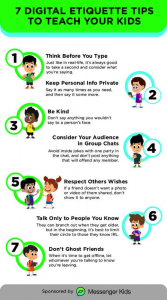I wanted to share the information below that I pulled together to help some of my counseling students. I think this is a great reminder for everyone as we finish out the school year virtually. Students of all ages need to be mindful of these things as we all tend to get relaxed when we are more familiar with a situation. I want to make sure our students remember “Netiquette” – the correct or acceptable way of communicating on the Internet.
Digital Etiquette = “Netiquette”
What is Digital Etiquette – “Netiquette”?
It is the electronic standards of conduct or procedure. The proper
rules of behavior while using technology devices and interacting with others.
5 things to know about digital etiquette (manners)
- Treat others how you want to be treated: This is the golden rule. Sometimes you need to be reminded about good manners, even online. Make
 sure to remember private or sensitive matters are best discussed one on one off the group chat. Make sure to be inclusive and kind to others just as you would be in person.
sure to remember private or sensitive matters are best discussed one on one off the group chat. Make sure to be inclusive and kind to others just as you would be in person. - Keep you messages and posts positive and truthful: You need to check over all your messages and posts to be sure they are not mean, sarcastic, negative or rude. Avoid posting anything that is not fact based like rumors or gossip. Remember your words are read by real people, all deserving of respectful and truthful information.
- Double-check your messages or comments before you post or send: You need to slow down and think about your posts, comments and emails before you send them. You need to realize that once you press send or post, there is no way to take back your words. Those words are out there for anyone to see and are now documented. You MUST read over anything you are going to write to see if it can be misinterpreted or if it could come off wrong. You should realize that coming off funny and sarcastic online is very hard – the reader cannot see your facial expression or hear your tone of voice. Sometimes a message that is meant to be funny does not come out that way.
- Keep your own and your friends personal things off the internet: Our world has a ton of photos, texts and videos that can be posted, copied forwarded, downloaded and altered very easily. You have to ask yourself how you would feel if your personal pictures or information was shared with those you didn’t want.
- Avoid digital drama: Instant messaging, texting and posting comments online are all in the moment communication but can last much longer then that. These words and messages can be shared quickly but the words are now documented for all to see forever. If you feel the conversation isn’t positive or nice you need to speak up or leave the conversation
https://mwhitmoredigitalcitizenship.weebly.com/digital-rights-and-reponsibilities.html
https://www.connectionsacademy.com/support/resources/article/the-abcs-of-virtual-classroom-etiquette
http://teach.ufl.edu/wp-content/uploads/2012/08/NetiquetteGuideforOnlineCourses.pdf
https://pumpic.com/security/netiquette-rules-for-kids/
For younger students:
https://www.youtube.com/watch?v=Q5xlCNy37mI
https://www.youtube.com/watch?v=M6B4_oUeZhw
Please continue to reach out to me as a resource for you and your family Socialworker@nullacademyolmc.org
Jamie Kagan-Heit





